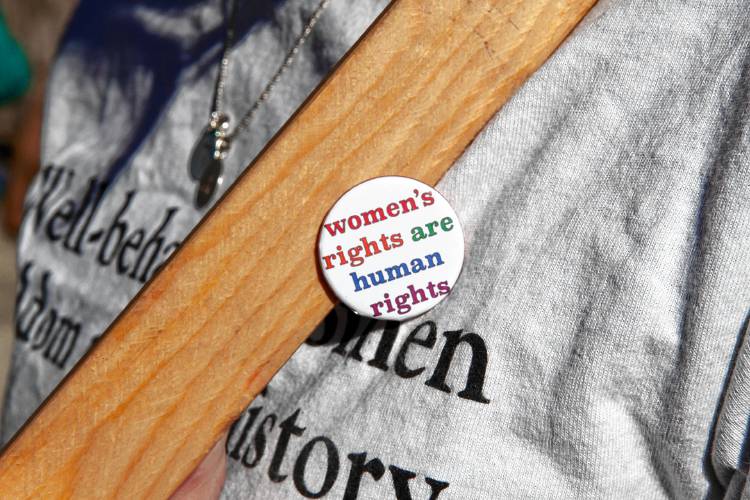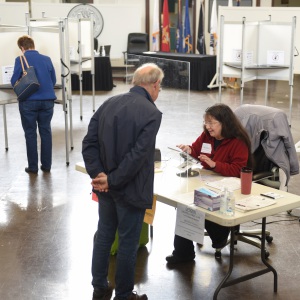Columnist Carrie Baker: Democracy and women’s rights in 2024
| Published: 12-27-2023 3:55 PM |
Over 60 percent of Americans support abortion rights, but last year Roe was overturned and 14 states now ban abortions in most circumstances. A president who lost the popular vote by millions appointed three staunch opponents of abortion to the Supreme Court, who joined two right-wing members of the court to overturn a half-century-old constitutional right to abortion. Then politicians in states with high levels of gerrymandering and voter suppression banned abortion.
One reason women are losing the right to abortion is men who do not support women’s rights have supermajority control of most state legislatures and Congress. In states banning abortion, women’s political representation is remarkably low. For example, men make up 80 percent or more of the state legislatures in West Virginia, South Carolina, Mississippi, Tennessee, Alabama and Oklahoma — all states that ban abortion at fertilization without exceptions for rape or incest. In West Virginia, women are only 12.7 percent of legislators. In all states banning abortion, men make up over two-thirds of legislators.
Across the world, women’s rights are weak where women are politically underrepresented. The U.S. lags behind 68 other countries in women’s political representation in national legislatures, with American women holding only 29 percent of seats in Congress. At the state level, women hold only 32.6 percent of state legislative seats. In the courts, women make up only one third of federal judges and only one third of state court judges.
Research shows that where women have greater political representation, governments are more likely to support reproductive rights; adopt policies to reduce gender-based violence; support pregnant women, mothers, infants and children; promote equal access to health, infrastructure and education; and address climate change. Meanwhile, research shows that countries with more men in power are more likely to engage in warfare and commit human rights abuses.
A significant gender gap exists in attitudes toward many public policy issues. For example, women are more likely to prefer that the government take an active role in providing a social safety net, including food assistance, health insurance, and welfare. Women are also more likely to support regulations to protect the environment and laws to protect gay men and lesbians from discrimination. In contrast, women are less likely than men to support military interventions and gun rights.
Political scientist Jennifer M. Piscopo explains: “Ideas about appropriate gender roles mean that women and men have different lived experiences, which shape women’s awareness of problems and their preferences for solving them. For instance, women are more likely than men to perform caretaking roles — like raising children — and both historically and today they are more likely than men to want stronger healthcare, housing, education, childcare and anti-poverty programs.”
If we as a society want to address these critical, life-affirming issues, we must elect more women because the men clearly aren’t going to do it. While there are obviously some women who oppose women’s rights — Marjorie Taylor Green, Elise Stefanik and Nikki Haley come to mind — research shows that more women in office overall means better protection of women’s rights and the well-being of all people.
Among industrialized countries, the U.S. has some of the highest rates of unwanted pregnancy, infant and maternal mortality, child poverty, and violence against women. We are one of only six countries in the world without a national guarantee of paid family leave, and the U.S. lags behind most industrialized country in levels of support for child care. Currently less than one in five workers have access to paid leave for most workers, meaning new mothers must return to their jobs just days or weeks after childbirth. Yet male-dominated legislatures repeatedly refuse to address these issues, claiming a lack of resources, while investing billions of dollars in militaries and wars.
Article continues after...
Yesterday's Most Read Articles
For example, President Joe Biden’s original Infrastructure and Jobs Act would have required employers to offer 12 weeks of paid family leave and provide subsidies for child care, two years of universal pre-K, and expanded long-term care options for the elderly and disabled, but the white-male-dominated Congress dropped these provisions when it passed the bill in 2021.
To regain the right to abortion, women are turning to direct democracy — ballot measures. Since the end of Roe, abortion rights have won seven ballot measures, even in ruby red states like Kansas and Ohio. In next year’s presidential elections, abortion ballot questions are likely in many more states, including Nevada, Montana, Nebraska, Florida, Missouri, Arkansas and South Dakota. But many states banning abortion do not allow ballot measures, including Alabama, Louisiana, Mississippi, Tennessee, Texas and West Virginia.
Women’s rights and representation are a barometer of democracy. The erosion of women’s rights is a canary in the coal mine of dying democracies. Rising autocratic regimes across the world are targeting women’s rights, particularly regarding reproduction and bodily autonomy. To build a true democracy that ensures women’s rights and better care for all, we need inclusive political leadership that reflects the diversity of our population and respects all of our rights.
Carrie N. Baker is a professor in the Program for the Study of Women and Gender at Smith College and a regular contributor to Ms. Magazine.



 Charlene Galenski: Blake Gilmore, a strong candidate for Deerfield’s Selectboard
Charlene Galenski: Blake Gilmore, a strong candidate for Deerfield’s Selectboard Annette Pfannebecker: Vote yes for Shores Ness and for Deerfield
Annette Pfannebecker: Vote yes for Shores Ness and for Deerfield Columnist Susan Wozniak: Rising costs long ago swamped hippie ideal
Columnist Susan Wozniak: Rising costs long ago swamped hippie ideal Guest columnist Rudy Perkins: Dangerous resolution pins ‘aggression’ on Iran
Guest columnist Rudy Perkins: Dangerous resolution pins ‘aggression’ on Iran
